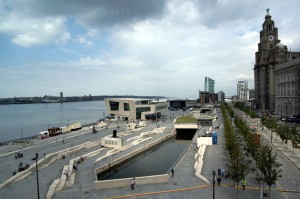A new year, an old controversy: UNESCO return their verdict on Liverpool Waters
Liverpool Landscapes was a blog charting new discoveries, news and developments affecting Liverpool's historic environment. It was regularly updated between 2007 and 2016.
Liverpool Landscape has now been retired, and most of the less time-dependent articles moved to Historic Liverpool.

Well, 2012 is just getting started, but UNESCO have set off the first fireworks in this year’s battle over the north docks.
After visiting the city in November, the UN inspectors are claiming that, should Peel’s plans go ahead, it would cause a “serious loss of historical authenticity“.
While UNESCO’s opinions are not a surprise to anyone who’s been following this story from the start, now that a formal response has been received it is up to Liverpool City Council and Peel to respond. English Heritage have also said that they would be happy to become involved “if invited”.
The magazine Seven Streets has published a number of articles on the Peel plans, on both sides of the argument (if I’ve read them right). All are worth reading, but the most recent one (by Robin Brown) especially so It highlights a few key things about the whole slanging match (as do the comments):
- Liverpool City Council asked to become a World Heritage Site. Did they not realize what they were getting into, or do they just not like the responsibility which comes with the award?
- The plans are forever being cited as crucial to jobs and economic prosperity by Joe Anderson and the Council, but as Adrian McEwan points out in his comment, there are other areas of the city which are “ghost towns”. The build-it-and-they-will-come mentality does not always work at the best of times, and certainly not in a recession, when there are vacant tenancies already in existence.
- The article suggests that there are hidden agendas at work, with the business community keen to see the end of the WHS (which they did not necessarily ask for). The UNESCO / Peel Waters shenanigans simply gives them what Brown calls a “battering ram” with which to attack it, in the hopes of longer term implications for future non-Peel developments.
- There is also the mention of agendas on the heritage lobby side. It is suggested that this group are often against development for its own sake, and that the Waters are a good example. I don’t necessarily agree: the heritage lobby (I’m not sure if I count as part of such a thing or not, but anyway…) can certainly be too insistent or restricted in their vision for change, but I don’t think this constitutes an agenda. Either way, this side needs to maintain water-tight and specific arguments if it is to remain credible.
What the Seven Streets article does identify is that the tone of the argument against the WHS has probably been deliberately skewed (towards such things as ‘outsiders’ coming in and stealing our investments) in order to rid the city of a perceived barrier to further development. This doesn’t produce a useful long term solution, but then perhaps not everyone is so keen on one.
Comments are closed.




The agendas on the business side aren’t really hidden – some lobby groups in Liverpool are quite clear in their desire to limit – or do away with – the WHS. Peel have, possibly coincidentally, handed them a useful means by which to further that aim.
As for the heritage lobby I dont think there is any agenda at work. Bit I do think that some elements will likely set their faces against new development, regardless of merit.
I just hope common sense prevails and we get the best of both worlds.
Thanks for the comment, Robin. Perhaps you’re right – the motivations on the business side are not hidden, especially when coming from the Council too. I just wonder whether the longer term effects of removing the WHS status are clear in the minds of those members of the public whose comments are pro-development. There’s a lot of support for the Peel scheme, but I’d like to see it go ahead in some form while keeping the WHS. After all, these designations are meant to ensure proper scrutiny of plans, not a blockade of them.
As you say, common sense will see the best of both worlds come about: I think that means developments operating within the heritage protection system (and not despite it, nor at the cost of its removal)